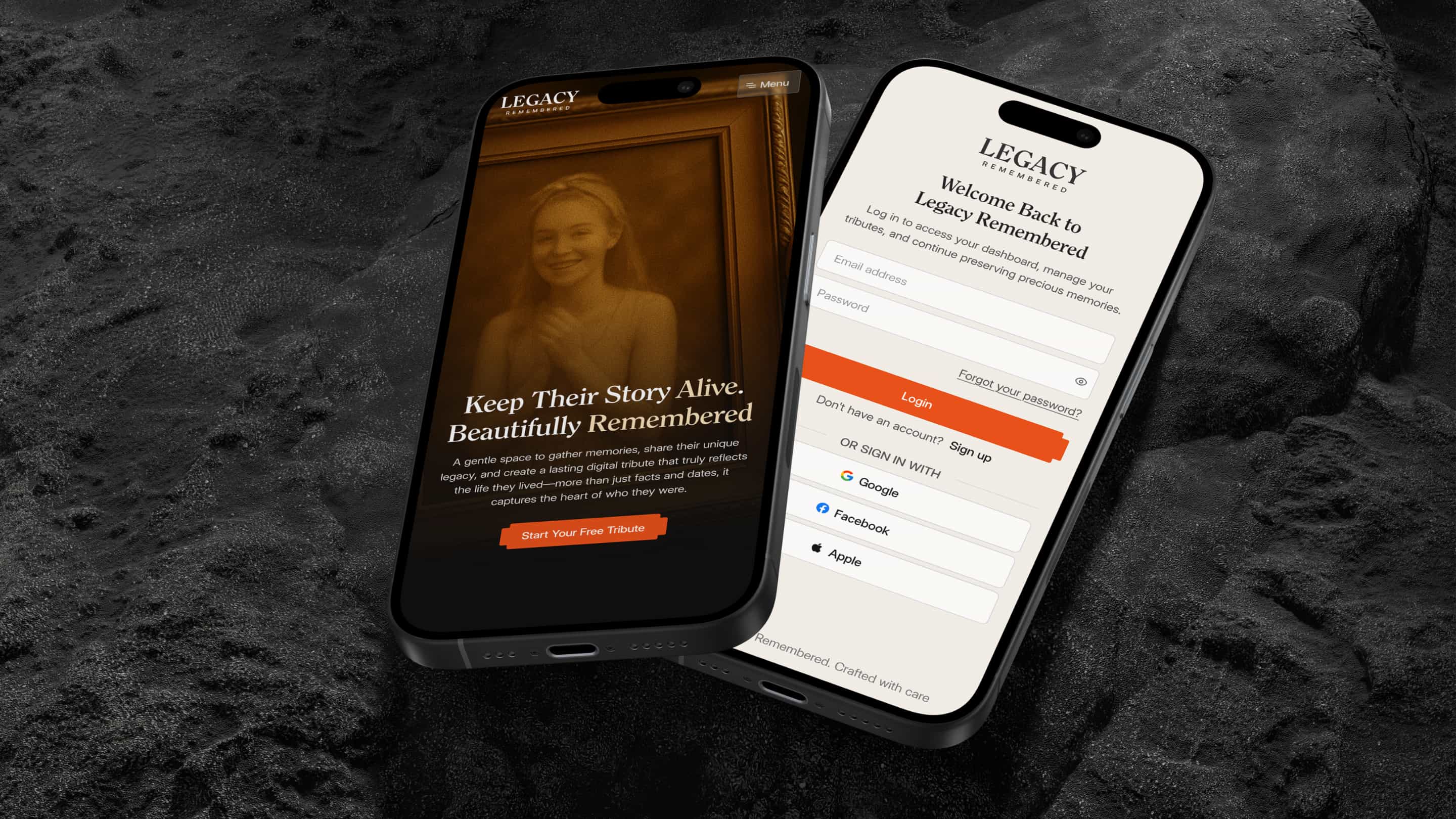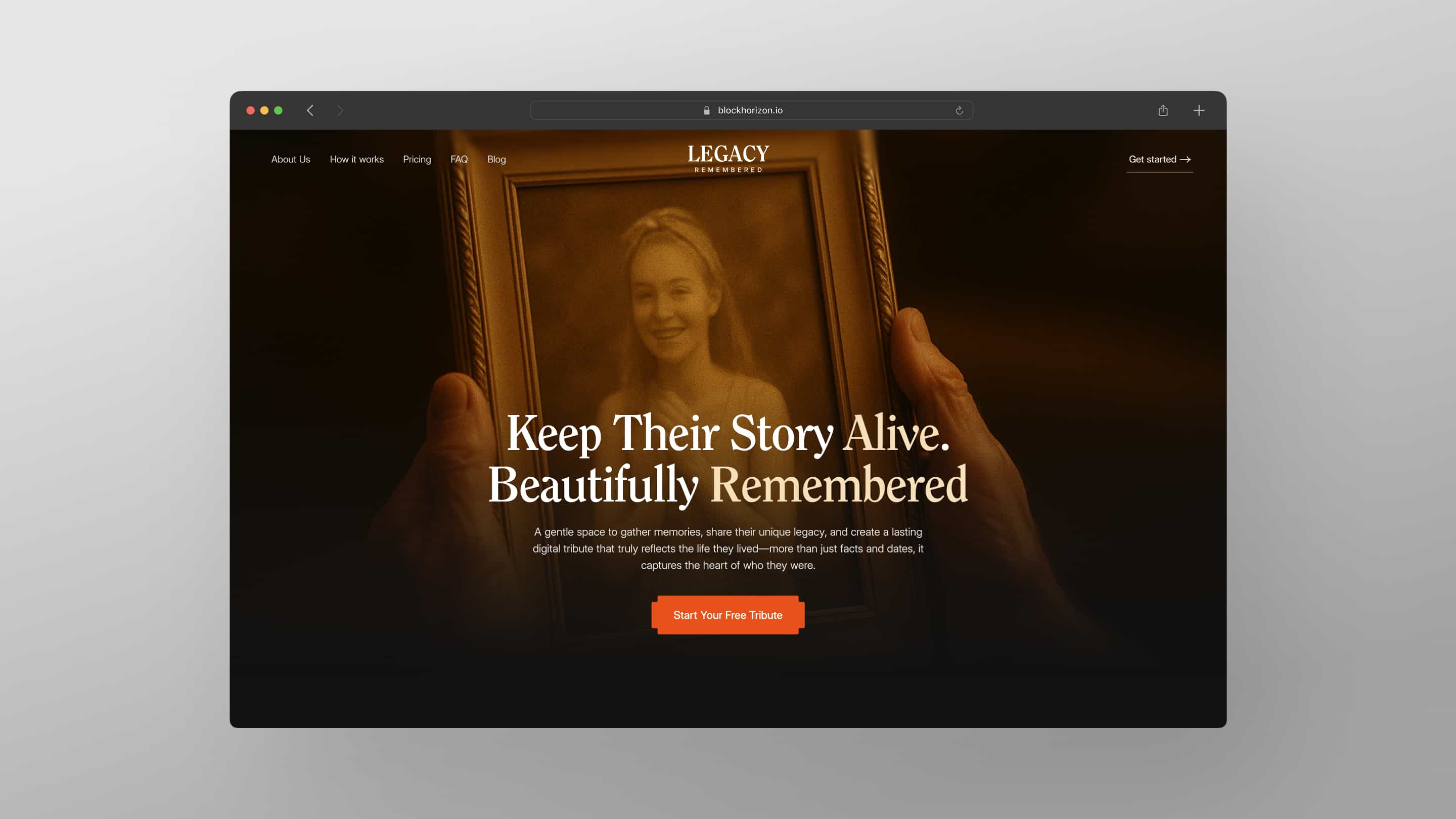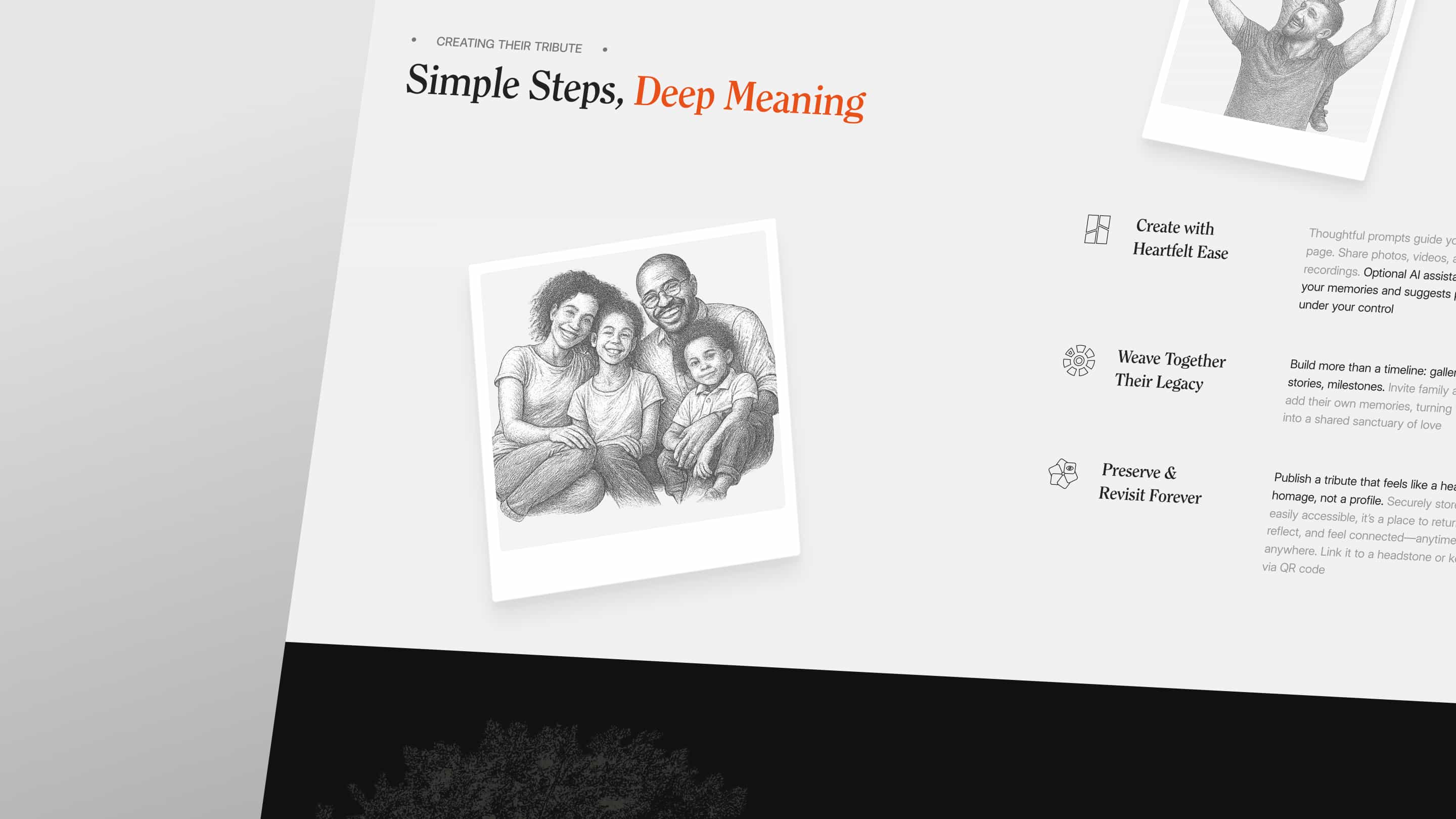Project Overview
Legacy Remembered approached LoudFace to create a complete digital ecosystem, from brand identity to a full-stack memorial platform. As a spinoff of Legacy Headstones (a century-old family business), they needed to digitize the memorial experience while maintaining the trust and gravitas of their established brand.
What we delivered:
- Complete brand identity system
- Marketing website with advanced user flows
- Full-stack web application with AI integration
- Payment and subscription systems
- QR code integration for physical headstones

The Challenge: Building Trust in a Sensitive Market
The Business Context
Legacy Headstones had spent 100+ years building trust in the memorial space. Their challenge wasn't awareness, it was translating that offline credibility into a digital product that families would trust with their most precious memories.
Technical Complexity We Encountered
Multi-layered Architecture Requirements:
- User authentication and account management
- AI-powered content assistance for memorial creation
- Media upload and optimization (photos, videos, audio)
- Subscription billing integration
- QR code generation and tracking
- Privacy controls for sensitive content
The Real Challenge: Most agencies treat this as separate projects. We learned that memorial platforms require treating branding, marketing, and application development as interconnected systems, not sequential phases.

Our Approach: Integrated Development Strategy
Phase 1: Brand Foundation (Weeks 1-4)
The Branding Hurdle:
Initial brand explorations missed the mark. The client provided feedback, but we misinterpreted their direction three consecutive times, causing significant frustration and extending this phase by 4 weeks.
What we learned: For emotionally-charged products, brand approval requires multiple stakeholder alignment. We shifted to more frequent check-ins with visual mockups before full execution.
Final Solution: A tree-inspired logo representing longevity, paired with warm wood textures and human-centered photography. The visual system balanced memorial gravitas with approachable technology.
Phase 2: Website Development (Weeks 4-9)
Strategic Approach:
Rather than building a typical marketing site, we created a user journey that addressed the psychology of grief. The website serves as both marketing tool and onboarding experience.
Key Design Decisions:
- Gentle, guided storytelling rather than aggressive CTAs
- Extensive use of social proof without exploiting tragedy
- Clear privacy messaging (critical for this audience)
- Progressive disclosure of features to avoid overwhelming users
Phase 3: Application Development (Weeks 9-15)
Technical Architecture:
- Frontend: React-based dashboard with step-by-step memorial creation
- Backend: Custom API with AI integration for writing assistance
- Media Handling: Automated compression and CDN distribution
- Payment System: Tiered subscriptions with add-on products (QR codes, printed books)
Development Challenges We Solved:
- AI Integration Complexity: Implementing writing assistance that felt helpful, not intrusive. We built custom prompts that respect the emotional context of memorial writing.
- Media Upload Optimization: Families upload high-resolution photos and long videos. We implemented client-side compression with progress indicators to maintain upload reliability.
- Privacy Architecture: Memorial pages needed flexible privacy controls. We built a system allowing public, private, or link-only access with family member permissions.

Real Challenges We Faced
Client Relationship Management
The Problem: Midway through the project, client satisfaction dropped to 6/10 due to repeated revisions.
Our Response:
- Implemented daily standups during critical phases
- Created shared design review processes with recorded feedback sessions
- Established revision tracking to prevent miscommunication loops
Result: Project completion with restored client confidence, but it extended timeline by 2 weeks.
Technical Scope Expansion
Initial Scope: Marketing website + simple memorial creation
Reality: Full-stack application with AI, payment processing, and multi-media handling
The Learning: Memorial platforms have hidden complexity. What seems like "simple page creation" actually requires robust content management, privacy controls, and emotional design considerations.
Balancing Speed vs. Sensitivity
The Tension: Client wanted fast launch for business reasons, but the product demanded careful attention to user experience in grief contexts.
Our Approach: Prioritized core functionality over nice-to-have features. Launched with essential memorial creation, then iterated based on user feedback.

Results & Impact
Quantitative Outcomes
- Launch Timeline: 5 months (2 months over initial estimate)
- Platform Features: 15+ user-facing features with full mobile responsiveness
- Technical Architecture: Scalable to handle 10,000+ simultaneous users
Product Success Metrics
- User Flow Completion: 89% of users who start memorial creation finish the process
- Platform Stability: 99.9% uptime during first 90 days post-launch
- Client Business Impact: Successfully launched with pre-sales campaign generating initial revenue
What Made This Project Successful
- Integrated Approach: Treating branding, website, and application as one cohesive system rather than separate projects
- Technical Flexibility: Building custom solutions rather than forcing the client into existing templates
- Emotional Intelligence: Understanding that memorial platforms require different UX considerations than typical SaaS products

Key Takeaways for Similar Projects
For Potential Clients
Budget Considerations: Memorial/legacy platforms typically require 40-60% more development time than standard web applications due to privacy, emotional UX, and media handling requirements.
Timeline Reality: Plan 5-6 months minimum for a full brand + website + application project with AI integration. Rush timelines compromise the thoughtful design these products require.
Team Requirements: You need specialists who understand both technical complexity and emotional design. Generic development teams often miss the psychological considerations essential for memorial platforms.
Technical Complexity Factors
- AI Integration: Adds 3-4 weeks to development timeline
- Multi-media Handling: Video/audio upload requires robust infrastructure planning
- Privacy Architecture: Memorial platforms need more complex permission systems than typical apps
- Payment Integration: Subscription models with add-on products require careful UX design
Why This Project Matters
Legacy Remembered now serves families creating lasting digital memorials with the same care and permanence their physical headstones provided for over a century. The platform successfully bridges traditional memorial practices with modern technology, proving that complex emotional products can benefit from thoughtful digital transformation.
For potential clients: This case study demonstrates our capability to handle projects requiring both technical sophistication and emotional intelligence—essential for products that serve people during significant life moments.





